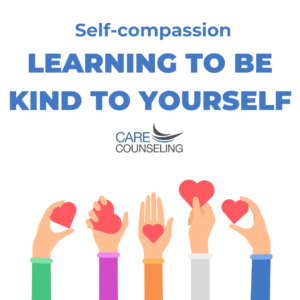Self-Compassion: Learning to Be Kind to Yourself
 In our fast-paced, demanding world, we often find ourselves focusing on being kind and compassionate toward others. But what about being compassionate toward yourself? Self-compassion is a powerful practice that many of us overlook, yet it’s essential for our overall well-being and mental health
In our fast-paced, demanding world, we often find ourselves focusing on being kind and compassionate toward others. But what about being compassionate toward yourself? Self-compassion is a powerful practice that many of us overlook, yet it’s essential for our overall well-being and mental health
Understanding Self-Compassion
Self-compassion involves treating yourself with the same care, kindness, and understanding that you would offer to a close friend in times of struggle or hardship. It’s about being your own best friend and ally. Instead of being overly self-critical, self-compassion encourages you to embrace self-kindness and acknowledge that it’s okay to make mistakes and experience setbacks.
Dr. Kristin Neff, a leading researcher in self-compassion, outlines three core components of this practice:
- Self-Kindness: Rather than harsh self-judgment, practice self-kindness. Treat yourself with warmth and understanding when you face difficult moments or make errors. Remember, we’re all human, and no one is perfect.
- Common Humanity: Understand that you’re not alone in your suffering. All humans experience challenges, pain, and setbacks at various points in their lives. Recognizing our shared humanity can help you feel less isolated and more connected to others.
- Mindfulness: Be mindful of your thoughts and feelings, without judgment. Accept your experiences without trying to suppress or deny them. This can help you navigate difficult emotions and gain a more balanced perspective.
The Benefits of Self-Compassion
Self-compassion offers numerous benefits for your mental and emotional well-being. Research has shown that practicing self-compassion can:
- Reduce Stress: Self-compassion can help you better manage stress and reduce the negative impact it has on your mental health. When you’re kind to yourself, you’re less likely to engage in self-criticism, which can exacerbate stress.
- Enhance Resilience: Self-compassion can increase your emotional resilience, helping you bounce back from setbacks and challenges with greater ease.
- Improve Self-Esteem: Paradoxically, being kind to yourself can lead to improved self-esteem. When you acknowledge your imperfections and treat yourself with kindness, your self-worth increases.
- Boost Mental Health: Self-compassion has been linked to reduced symptoms of depression and anxiety. It can also help manage symptoms in those already dealing with these conditions.
- Enhance Relationships: Being kind to yourself can positively impact your relationships with others. It’s easier to extend compassion to others when you’ve learned to extend it to yourself.
Practical Tips for Learning Self-Compassion
- Practice Self-Kindness: The next time you make a mistake or experience a setback, respond with self-kindness. Offer yourself words of encouragement, as you would to a friend in a similar situation.
- Develop a Self-Compassion Mantra: Create a self-compassion mantra that you can repeat in challenging moments. For example, “I am imperfect, and that’s okay. I am doing the best I can.”
- Mindfulness Meditation: Incorporate mindfulness meditation into your daily routine. This can help you become more aware of your thoughts and feelings without judgment.
- Write a Self-Compassion Letter: Write a letter to yourself, expressing kindness and understanding. Be as compassionate as you would be to a dear friend in need.
- Seek Support: If self-compassion is challenging for you, consider seeking the guidance of a therapist or counselor who specializes in self-compassion and self-esteem issues.
- Embrace Self-Care: Prioritize self-care practices that nourish your physical, emotional, and mental well-being. Self-compassion and self-care go hand in hand.
Remember, self-compassion isn’t about perfection; it’s about embracing your imperfections and treating yourself with the same love and care you’d offer to a cherished friend. In doing so, you’ll find greater happiness, inner peace, and resilience in your journey towards a healthier, more compassionate you.



























